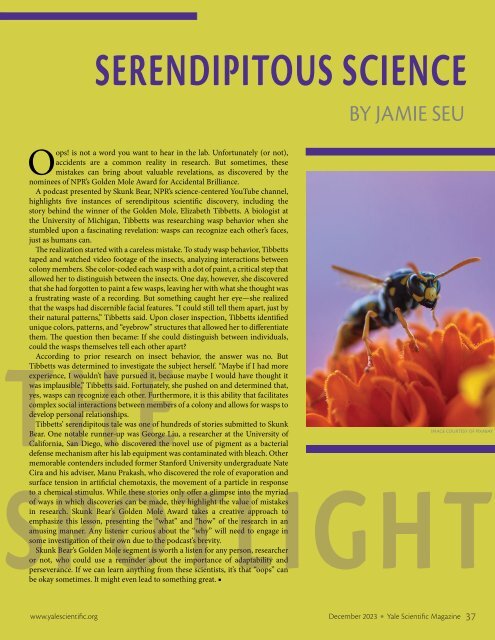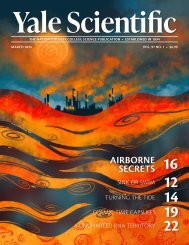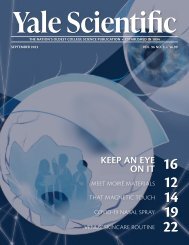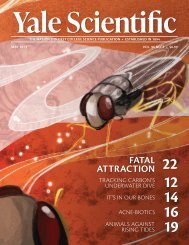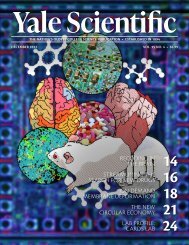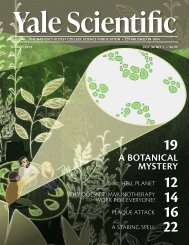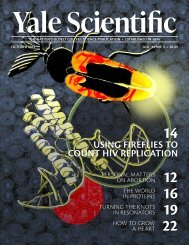YSM Issue 96.4
You also want an ePaper? Increase the reach of your titles
YUMPU automatically turns print PDFs into web optimized ePapers that Google loves.
SERENDIPITOUS SCIENCE<br />
BY JAMIE SEU<br />
Oops! is not a word you want to hear in the lab. Unfortunately (or not),<br />
accidents are a common reality in research. But sometimes, these<br />
mistakes can bring about valuable revelations, as discovered by the<br />
nominees of NPR’s Golden Mole Award for Accidental Brilliance.<br />
A podcast presented by Skunk Bear, NPR’s science-centered YouTube channel,<br />
highlights five instances of serendipitous scientific discovery, including the<br />
story behind the winner of the Golden Mole, Elizabeth Tibbetts. A biologist at<br />
the University of Michigan, Tibbetts was researching wasp behavior when she<br />
stumbled upon a fascinating revelation: wasps can recognize each other’s faces,<br />
just as humans can.<br />
The realization started with a careless mistake. To study wasp behavior, Tibbetts<br />
taped and watched video footage of the insects, analyzing interactions between<br />
colony members. She color-coded each wasp with a dot of paint, a critical step that<br />
allowed her to distinguish between the insects. One day, however, she discovered<br />
that she had forgotten to paint a few wasps, leaving her with what she thought was<br />
a frustrating waste of a recording. But something caught her eye—she realized<br />
that the wasps had discernible facial features. “I could still tell them apart, just by<br />
their natural patterns,” Tibbetts said. Upon closer inspection, Tibbetts identified<br />
unique colors, patterns, and “eyebrow” structures that allowed her to differentiate<br />
them. The question then became: If she could distinguish between individuals,<br />
could the wasps themselves tell each other apart?<br />
THE<br />
According to prior research on insect behavior, the answer was no. But<br />
Tibbetts was determined to investigate the subject herself. “Maybe if I had more<br />
experience, I wouldn’t have pursued it, because maybe I would have thought it<br />
was implausible,” Tibbetts said. Fortunately, she pushed on and determined that,<br />
yes, wasps can recognize each other. Furthermore, it is this ability that facilitates<br />
complex social interactions between members of a colony and allows for wasps to<br />
develop personal relationships.<br />
Tibbetts’ serendipitous tale was one of hundreds of stories submitted to Skunk<br />
IMAGE COURTESY OF PIXABAY<br />
Bear. One notable runner-up was George Liu, a researcher at the University of<br />
California, San Diego, who discovered the novel use of pigment as a bacterial<br />
defense mechanism after his lab equipment was contaminated with bleach. Other<br />
memorable contenders included former Stanford University undergraduate Nate<br />
SPOTLIGHT<br />
Cira and his adviser, Manu Prakash, who discovered the role of evaporation and<br />
surface tension in artificial chemotaxis, the movement of a particle in response<br />
to a chemical stimulus. While these stories only offer a glimpse into the myriad<br />
of ways in which discoveries can be made, they highlight the value of mistakes<br />
in research. Skunk Bear’s Golden Mole Award takes a creative approach to<br />
emphasize this lesson, presenting the “what” and “how” of the research in an<br />
amusing manner. Any listener curious about the “why” will need to engage in<br />
some investigation of their own due to the podcast’s brevity.<br />
Skunk Bear’s Golden Mole segment is worth a listen for any person, researcher<br />
or not, who could use a reminder about the importance of adaptability and<br />
perseverance. If we can learn anything from these scientists, it’s that “oops” can<br />
be okay sometimes. It might even lead to something great. ■<br />
www.yalescientific.org<br />
December 2023 Yale Scientific Magazine 37


